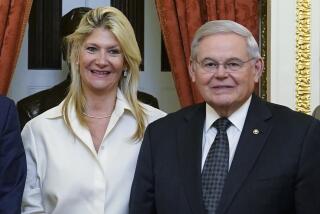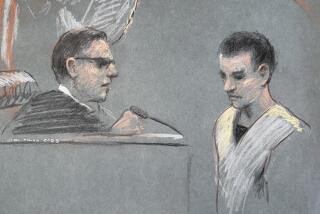Weinberger Indicted in Iran-Contra Affair : Investigation: Ex-defense secretary declares his innocence, calls felony charges ‘moral and legal outrage.’
- Share via
WASHINGTON — Reaching to the heart of the Ronald Reagan Administration, a federal grand jury Tuesday charged former Defense Secretary Caspar W. Weinberger with five felony counts of perjury, obstruction of justice and making false statements during criminal and congressional investigations of the Iran-Contra scandal.
Weinberger, 74, who denounced the indictment as “a grotesque distortion of the prosecutorial power and a moral and legal outrage,” declared his innocence and vowed to “fight this injustice to the end.”
Independent counsel Lawrence E. Walsh, in seeking the indictment of the highest Reagan Administration official to be charged in his 5 1/2-year investigation, acted a day before the five-year statute of limitations on a sworn Weinberger statement to Congress--key to two charges--would have run out.
While it had been known that Weinberger was under investigation for allegedly concealing his knowledge of the 1985-86 arms for hostages deal with Iran, the indictment also charged him with lying, and failing to disclose notes that he had made about secret aid to the Contras during a ban on such support.
Specifically, the indictment charged Weinberger with:
--Obstructing the 1987 investigations by Congress’ Iran-Contra committees by withholding and concealing the existence of notes he had taken that were relevant to their inquiries.
--Making a false statement to the House Iran-Contra panel on June 17, 1987, about whether he knew of Saudi-Arabian contributions to Nicaragua’s Contras.
--Committing perjury before the Iran-Contra committees on July 31, 1987, when he falsely denied that he knew Israel was to transfer Hawk missiles to Iran in November, 1985, as part of the arms-for-hostages deal.
--Perjuring himself before the same panels at the same time about whether he knew that the United States would replenish Israeli missile stocks used in the Iran arms sales.
--Making a false statement to Walsh’s office on whether he took notes of his phone calls and meetings, whether he had produced relevant notes to Iran-Contra investigators and whether he had deliberately withheld any documents.
If convicted, Weinberger would face a maximum penalty of five years in prison and $250,000 in fines for each of the five counts.
Weinberger, who read a statement to reporters two hours after the indictment was returned, declined to answer questions. He said that he had turned down an offer from Walsh’s office to plead guilty to a misdemeanor and would not give statements “which were not true about myself or others.”
“I would not give false testimony nor would I enter a false plea,” he said. “Because of this refusal, which to me is a matter of conscience, I have now been charged with multiple felonies.”
Weinberger and his attorney, Robert S. Bennett, declined to say who in Walsh’s office allegedly had tried to elicit “false testimony” from him.
Mary Belcher, a spokeswoman for Walsh, declined to confirm or deny that a plea bargain offer had been made.
The 31-page indictment stated no motive for Weinberger’s alleged actions, but prosecutors have been operating on the theory that Reagan Administration officials joined in a cover-up after the secret arms for hostages deal began to be disclosed in 1986.
In what appeared to be a reference to that theory, the indictment noted that during a Nov. 24, 1986, White House meeting as the scandal began to break, then-Atty. Gen. Edwin Meese III told a group of high Administration officials that the November, 1985, Israeli Hawk shipment may have been illegal but that Reagan knew nothing about it at the time.
Meese then asked whether anyone knew of anything else that had not been revealed. “No one contradicted Mr. Meese’s incorrect statement concerning President Reagan’s lack of knowledge, although several of those present, including the defendant, Caspar W. Weinberger, had contrary information,” the indictment stated.
Others at that meeting included Reagan, then Vice President George Bush, Secretary of State George P. Shultz, CIA Director William J. Casey, White House Chief of Staff Donald T. Regan and White House National Security Adviser John M. Poindexter. Shultz has testified that he later met privately with Reagan and reminded him that he had been told of the November, 1985, Hawk shipment.
Much of the ammunition for the indictment came from Weinberger’s extensive notes, which he had placed in the Library of Congress and subsequently gave Walsh’s investigators authority to examine.
The indictment alleged that Weinberger took more than 1,700 pages of daily notes and hundreds of additional pages during White House meetings. But he gave the congressional committees notes from only one White House meeting and is alleged to have falsely denied that he had other relevant notes.
Craig A. Gillen, the lead prosecutor in the case, told reporters after the indictment was returned that it “has significantly narrowed our continuing investigation.
“I don’t want to say that we’re trying to get closer to President Reagan,” Gillen said. “That’s not what this indictment is about. What this indictment is about is Caspar Weinberger.”
The indictment, presumably drawing further from Weinberger’s notes, also touched on high-level Reagan Administration intrigue as the scandal began to unravel. It said that Prince Bandar bin Sultan, Saudi Arabia’s ambassador to the United States, had told Weinberger that then-First Lady Nancy Reagan had said that Shultz was disloyal during the crisis and should be removed.
“Prince Bandar reported that he had then proposed to Mrs. Reagan that the defendant . . . replace Secretary Shultz, and that Mrs. Reagan had commented favorably on that proposal,” the indictment said.
In charging that Weinberger falsely denied to Congress in his June, 1987, sworn statement that he was aware of Saudi Arabian contributions to the Nicaraguan rebels, the indictment alleged that Gen. John V. Vessey, then chairman of the Joint Chiefs of Staff, told Weinberger of the Saudi aid in 1985 and that Weinberger repeated it to Robert C. McFarlane, Poindexter’s predecessor as national security adviser, among others.
Both Weinberger and the indictment agree that he opposed the sale of arms to Iran but his counsel, Bennett, contended that made him “a hero” of the affair, while the charges cite his position as a demonstration that he knew of the November, 1985, Hawk shipment and related events, contrary to his testimony.
REAGAN LOYALIST: Profile of Weinberger’s long service in government. A14
More to Read
Sign up for Essential California
The most important California stories and recommendations in your inbox every morning.
You may occasionally receive promotional content from the Los Angeles Times.













